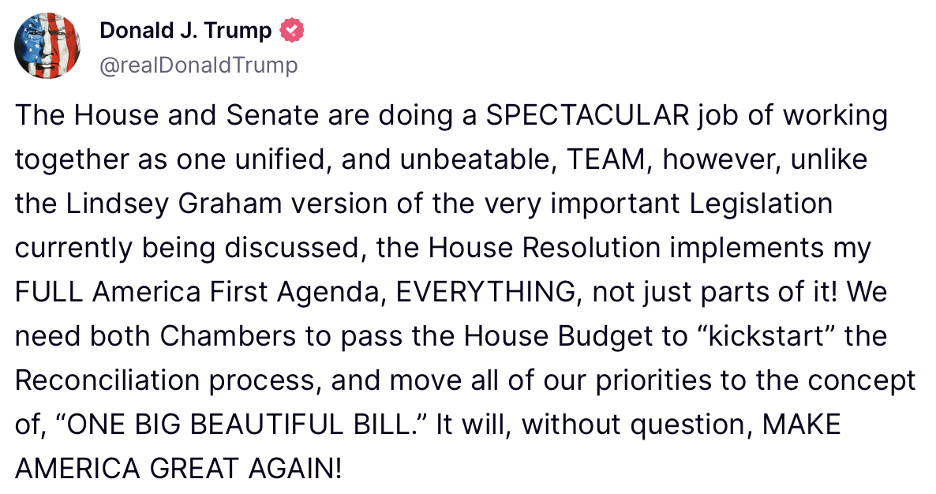House and Senate Advance Diverging Budget Resolutions as Trump Calls for ‘One Big Beautiful Bill’
- Todd Phillips

- Feb 26, 2025
- 2 min read
It appears that the path to “One Big Beautiful Bill” took a big step forward, but isn’t quite done yet.
On February 25, 2025, the House of Representatives narrowly approved a fiscal year 2025 budget resolution in a 217-215 vote. The resolution tasks the House Ways and Means Committee with implementing $4.5 trillion in net tax cuts over the next decade, contingent on at least $2 trillion in federal spending reductions. The measure also calls for a $4 trillion increase to the U.S. debt ceiling, currently set at $36.1 trillion.
Earlier, on February 20, the Senate took a different approach, passing a "skinny" budget resolution by a 52-48 margin. The Senate's version does not include tax reconciliation instructions but focuses on border security, defense funding, and domestic energy production, along with unspecified spending cuts. The chamber plans to address tax policy and further spending reductions in a second budget resolution for fiscal year 2026.
Trump Weighs In: ‘One Big Beautiful Bill’
Former President Donald Trump has publicly thrown his support behind the House resolution, calling it the full implementation of his America First Agenda. In a recent post on X (formerly Twitter), he urged both chambers to unite behind the House budget, stating:
“The House and Senate are doing a SPECTACULAR job of working together as one unified, and unbeatable, TEAM, however, unlike the Lindsey Graham version of the very important Legislation currently being discussed, the House Resolution implements my FULL America First Agenda, EVERYTHING, not just parts of it! We need both Chambers to pass the House Budget to ‘kickstart’ the Reconciliation process, and move all of our priorities to the concept of, ‘ONE BIG BEAUTIFUL BILL.’ It will, without question, MAKE AMERICA GREAT AGAIN!”
Trump's message underscores a major divide between House and Senate Republicans. While the House resolution reflects his full tax and spending agenda, the Senate's more cautious approach, influenced by Senator Lindsey Graham and others, defers major tax policy changes to a future reconciliation bill.
Next Steps: House and Senate Must Reconcile Differences
For the budget resolution to take effect, both the House and Senate must adopt an identical version. This is essential to unlock the budget reconciliation process, allowing legislation to pass in the Senate with a simple majority vote rather than the usual 60-vote threshold.
To reconcile their differences, lawmakers will either need to:
Convene a House-Senate conference committee to negotiate a final version.
Exchange amendments between chambers until they reach a compromise.
The House resolution extends and expands the 2017 Trump tax cuts, many of which are set to expire at the end of 2025. The Senate’s version delays tax policy changes and focuses on near-term spending priorities, including $175 billion for border security and $150 billion for defense.
What This Means for Tax Policy
If the House version prevails, taxpayers could see major, long-term reductions in income, corporate, and capital gains taxes. If the Senate’s approach dominates, tax changes could be postponed until a future reconciliation bill in 2026.
With Trump calling for swift action, Republican leaders will need to navigate these competing priorities carefully.





Comments